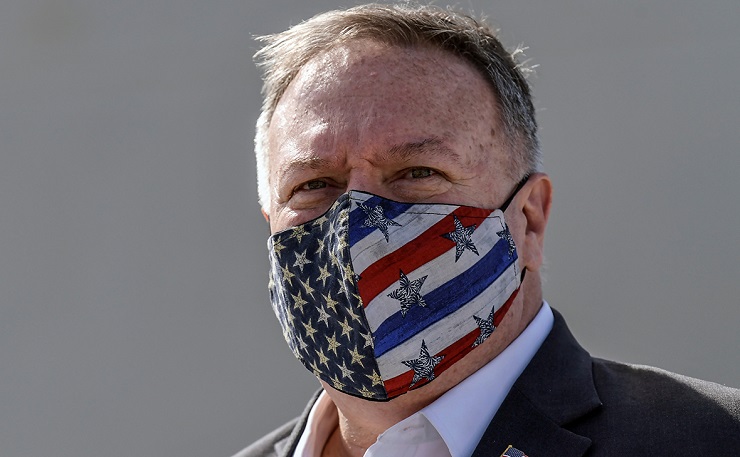If a significant part of Mike Pompeo’s job as a Secretary of State was to persuade nations to align their foreign policies with that of the US on issues like China and Iran, he has clearly failed in it. Instead of aligning their policies with the US, even the US’ European allies are making their own and independent policies and engaging with China accordingly. Certainly, Europe doesn’t see China as a ‘rival’ country, needing to be ‘contained’ or rolled back. It is already prioritizing engagement over confrontation. On top of it is the fact that Europe somehow is already thinking in terms of establishing its own security system independent of NATO. ‘Trans-Atlanticism’, as it stands, is facing an existential crisis. Similarly, if Pompeo had in his mind another round of UN arms embargoes on Iran, he stands absolutely shattered; for, not only have the embargoes been lifted, but no European ally agreed with him to reimpose and extend these sanctions. If Pompeo, through a consistent application of pressure on Iran, had wanted to make Iran make a mistake and unilaterally leave JCPOA, it hasn’t happened either. If Iran had decided to leave JCPOA, Europe would have felt compelled to follow the US line. This didn’t happen because of a gross miscalculation of Pompeo, a US secretary who has been threatening the International Criminal Court even for his personal stakes in the Court’s Afghan investigation.
Pompeo, the man of US foreign policy catastrophes, tended largely to think the UN and other agencies would succumb to his pressure. What he failed and continues to fail to realise is that the world has largely changed in past few years. Whereas Europe has largely stopped playing a second fiddle to the US, the fact that powerful alternatives, like China and Russia, to the US dominated system have emerged has made countries, previously solely at the receiving end of US foreign policy goals, increasingly assert themselves. In other words, had Iran not received support from China and Russia, it would have found it extremely difficult to survive the “toughest sanctions” ever imposed on it by the US.
With UN sanctions on Iran now lifted and with the US unable to reimpose them, it is apparent that Pompeo’s apparently harmless admission of lying, cheating and stealing as CIA director has left an indelible imprint on how he is seen across the world and how his foreign policy goals are looked upon as selfish pursuits of a hawk whose politics thrives on a theory of war and chaos that doesn’t leave even the Vatican out of it.
On September 30, the Vatican rebuffed a request from Mike Pompeo for an audience with Pope Francis, and accused the secretary of state of trying to drag the Catholic Church into the US presidential election by denouncing its relations with China. The extraordinary remarks from the two top diplomatic officials at the Vatican came after Pompeo accused the Church in an article and a series of tweets in September about the Church putting its “moral authority” at risk by renewing an agreement with China over the appointment of bishops.
Pompeo has, therefore, been rebuffed all the over world. His calls for a ‘global coalition’ against China have fell on deaf ears. While his counterparts from the QUAD may not be in a position to refuse him an audience like the Pope, they have certainly not responded in positive terms to Pompeo’s aggressive pursuit of a military coalition in the Indo-Pacific region.
His goal seems to have failed just as his efforts to provoke Iran into a war have. Even though he managed to kill General Soleimani and Iran even did respond, Iran, as it stands, largely understood that Pompeo’s plan was a deliberate orchestration of conflict, creating a scenario that would cost Iran the support it continues to receive from Europe and China and Russia.
Tehran, making a rational calculation, sees massive long-term advantages in fulfilling its commitments under the JCPOA until the 2025 timeline when the UN is due to close the Iran nuclear file.
According to Tehran, their patience has paid off. Therefore, as the rational calculation goes, instead of resorting to unnecessary military action, a trap that Pompeo has been trying to set up, it intends to continue to deploy patience as a strategic tool and looks forward to a similar termination of missile-related restrictions in 2023 before the final termination day on October 18, 2025, when all restrictions on Iran will be lifted, including the European Union’s remaining sanctions.
Now that the sanctions have been lifted and no roof came down on Iran after the US deadline expired, the message that comes from Tehran to all stakeholders, including Europe, does not indicate military aggression, as Pompeo would have wanted Europe to believe, but a resolve to behave as a responsible regional power whose defense build-up only aims at acquiring deterrence against aggression. Possibly, this nuanced stance is also with an eye on a likely Joe Biden presidency in the US.
As such, while a Joe Biden presidency may bring the US foreign policy out of the abyss that Pompeo has thrown it into, his continuation as the Secretary of State will erode whatever influence the US once had. Even small countries like Croatia have refused to subscribe to Pompeo’s anti-China narrative. When Pompeo visited Croatia earlier this month to tell them to ‘stay away from China’, Croatian prime minister, standing alongside Pompeo in the press conference and answering a question, said, adding to the long list of Pompeo’s failures, that he had met with Chinese Premier Li Keqiang five of six times since coming into office, is fully aware of all aspects of China’s deal, and believes Beijing will be fair and behave in accordance with international norms.
Salman Rafi Sheikh, research-analyst of International Relations and Pakistan’s foreign and domestic affairs, exclusively for the online magazine “New Eastern Outlook”.

